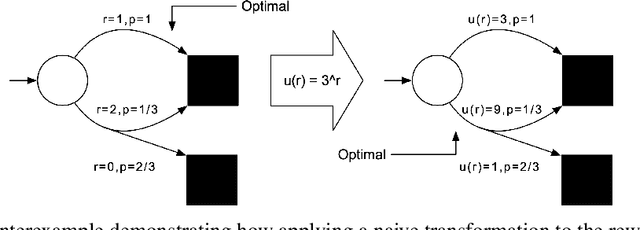Miroslav Štrupl
Deep Hedging Under Non-Convexity: Limitations and a Case for AlphaZero
Oct 02, 2025



Abstract:This paper examines replication portfolio construction in incomplete markets - a key problem in financial engineering with applications in pricing, hedging, balance sheet management, and energy storage planning. We model this as a two-player game between an investor and the market, where the investor makes strategic bets on future states while the market reveals outcomes. Inspired by the success of Monte Carlo Tree Search in stochastic games, we introduce an AlphaZero-based system and compare its performance to deep hedging - a widely used industry method based on gradient descent. Through theoretical analysis and experiments, we show that deep hedging struggles in environments where the $Q$-function is not subject to convexity constraints - such as those involving non-convex transaction costs, capital constraints, or regulatory limitations - converging to local optima. We construct specific market environments to highlight these limitations and demonstrate that AlphaZero consistently finds near-optimal replication strategies. On the theoretical side, we establish a connection between deep hedging and convex optimization, suggesting that its effectiveness is contingent on convexity assumptions. Our experiments further suggest that AlphaZero is more sample-efficient - an important advantage in data-scarce, overfitting-prone derivative markets.
On the Convergence and Stability of Upside-Down Reinforcement Learning, Goal-Conditioned Supervised Learning, and Online Decision Transformers
Feb 08, 2025Abstract:This article provides a rigorous analysis of convergence and stability of Episodic Upside-Down Reinforcement Learning, Goal-Conditioned Supervised Learning and Online Decision Transformers. These algorithms performed competitively across various benchmarks, from games to robotic tasks, but their theoretical understanding is limited to specific environmental conditions. This work initiates a theoretical foundation for algorithms that build on the broad paradigm of approaching reinforcement learning through supervised learning or sequence modeling. At the core of this investigation lies the analysis of conditions on the underlying environment, under which the algorithms can identify optimal solutions. We also assess whether emerging solutions remain stable in situations where the environment is subject to tiny levels of noise. Specifically, we study the continuity and asymptotic convergence of command-conditioned policies, values and the goal-reaching objective depending on the transition kernel of the underlying Markov Decision Process. We demonstrate that near-optimal behavior is achieved if the transition kernel is located in a sufficiently small neighborhood of a deterministic kernel. The mentioned quantities are continuous (with respect to a specific topology) at deterministic kernels, both asymptotically and after a finite number of learning cycles. The developed methods allow us to present the first explicit estimates on the convergence and stability of policies and values in terms of the underlying transition kernels. On the theoretical side we introduce a number of new concepts to reinforcement learning, like working in segment spaces, studying continuity in quotient topologies and the application of the fixed-point theory of dynamical systems. The theoretical study is accompanied by a detailed investigation of example environments and numerical experiments.
Upside-Down Reinforcement Learning Can Diverge in Stochastic Environments With Episodic Resets
May 13, 2022
Abstract:Upside-Down Reinforcement Learning (UDRL) is an approach for solving RL problems that does not require value functions and uses only supervised learning, where the targets for given inputs in a dataset do not change over time. Ghosh et al. proved that Goal-Conditional Supervised Learning (GCSL) -- which can be viewed as a simplified version of UDRL -- optimizes a lower bound on goal-reaching performance. This raises expectations that such algorithms may enjoy guaranteed convergence to the optimal policy in arbitrary environments, similar to certain well-known traditional RL algorithms. Here we show that for a specific episodic UDRL algorithm (eUDRL, including GCSL), this is not the case, and give the causes of this limitation. To do so, we first introduce a helpful rewrite of eUDRL as a recursive policy update. This formulation helps to disprove its convergence to the optimal policy for a wide class of stochastic environments. Finally, we provide a concrete example of a very simple environment where eUDRL diverges. Since the primary aim of this paper is to present a negative result, and the best counterexamples are the simplest ones, we restrict all discussions to finite (discrete) environments, ignoring issues of function approximation and limited sample size.
Reward-Weighted Regression Converges to a Global Optimum
Jul 19, 2021

Abstract:Reward-Weighted Regression (RWR) belongs to a family of widely known iterative Reinforcement Learning algorithms based on the Expectation-Maximization framework. In this family, learning at each iteration consists of sampling a batch of trajectories using the current policy and fitting a new policy to maximize a return-weighted log-likelihood of actions. Although RWR is known to yield monotonic improvement of the policy under certain circumstances, whether and under which conditions RWR converges to the optimal policy have remained open questions. In this paper, we provide for the first time a proof that RWR converges to a global optimum when no function approximation is used.
 Add to Chrome
Add to Chrome Add to Firefox
Add to Firefox Add to Edge
Add to Edge